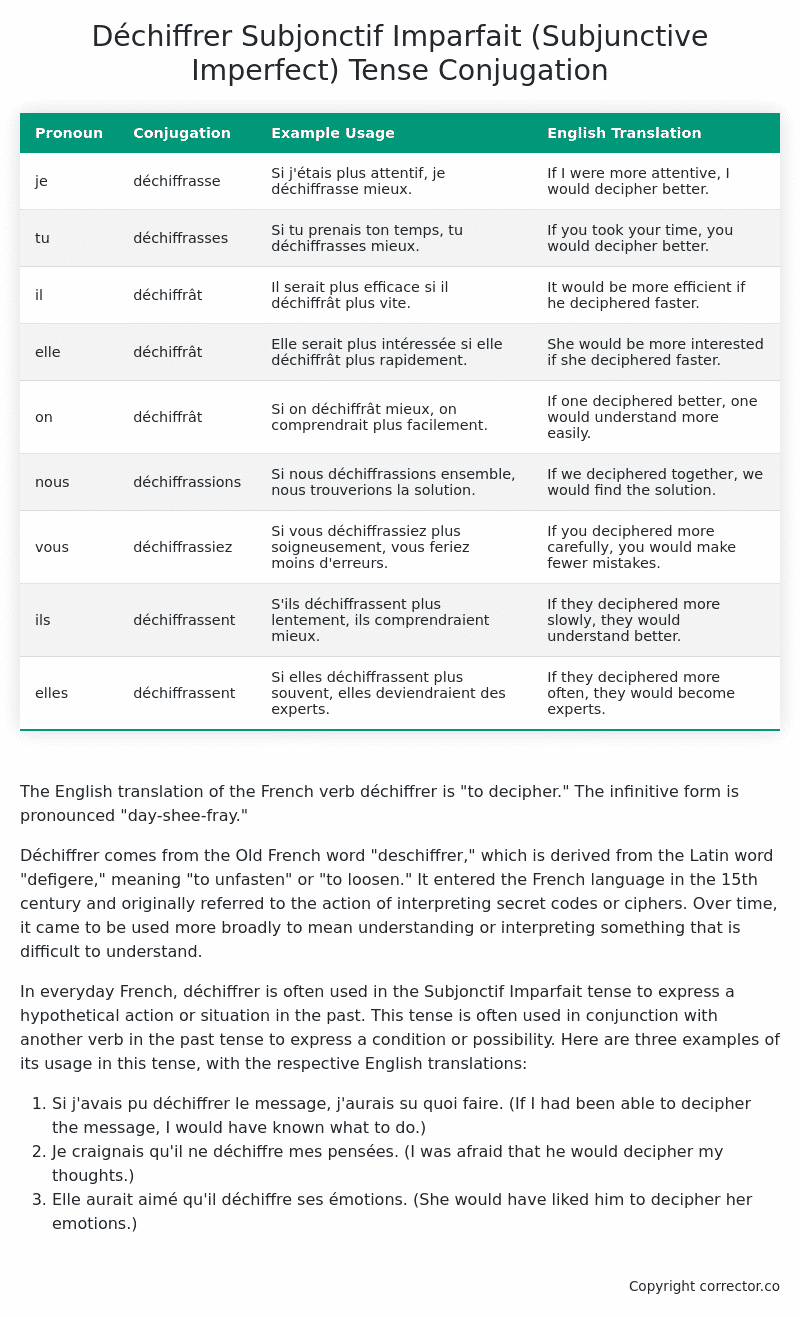Subjonctif Imparfait (Subjunctive Imperfect) Tense Conjugation of the French Verb déchiffrer
Introduction to the verb déchiffrer
The English translation of the French verb déchiffrer is “to decipher.” The infinitive form is pronounced “day-shee-fray.”
Déchiffrer comes from the Old French word “deschiffrer,” which is derived from the Latin word “defigere,” meaning “to unfasten” or “to loosen.” It entered the French language in the 15th century and originally referred to the action of interpreting secret codes or ciphers. Over time, it came to be used more broadly to mean understanding or interpreting something that is difficult to understand.
In everyday French, déchiffrer is often used in the Subjonctif Imparfait tense to express a hypothetical action or situation in the past. This tense is often used in conjunction with another verb in the past tense to express a condition or possibility. Here are three examples of its usage in this tense, with the respective English translations:
- Si j’avais pu déchiffrer le message, j’aurais su quoi faire. (If I had been able to decipher the message, I would have known what to do.)
- Je craignais qu’il ne déchiffre mes pensées. (I was afraid that he would decipher my thoughts.)
- Elle aurait aimé qu’il déchiffre ses émotions. (She would have liked him to decipher her emotions.)
Table of the Subjonctif Imparfait (Subjunctive Imperfect) Tense Conjugation of déchiffrer
| Pronoun | Conjugation | Example Usage | English Translation |
|---|---|---|---|
| je | déchiffrasse | Si j’étais plus attentif, je déchiffrasse mieux. | If I were more attentive, I would decipher better. |
| tu | déchiffrasses | Si tu prenais ton temps, tu déchiffrasses mieux. | If you took your time, you would decipher better. |
| il | déchiffrât | Il serait plus efficace si il déchiffrât plus vite. | It would be more efficient if he deciphered faster. |
| elle | déchiffrât | Elle serait plus intéressée si elle déchiffrât plus rapidement. | She would be more interested if she deciphered faster. |
| on | déchiffrât | Si on déchiffrât mieux, on comprendrait plus facilement. | If one deciphered better, one would understand more easily. |
| nous | déchiffrassions | Si nous déchiffrassions ensemble, nous trouverions la solution. | If we deciphered together, we would find the solution. |
| vous | déchiffrassiez | Si vous déchiffrassiez plus soigneusement, vous feriez moins d’erreurs. | If you deciphered more carefully, you would make fewer mistakes. |
| ils | déchiffrassent | S’ils déchiffrassent plus lentement, ils comprendraient mieux. | If they deciphered more slowly, they would understand better. |
| elles | déchiffrassent | Si elles déchiffrassent plus souvent, elles deviendraient des experts. | If they deciphered more often, they would become experts. |
Other Conjugations for Déchiffrer.
Le Present (Present Tense) Conjugation of the French Verb déchiffrer
Imparfait (Imperfect) Tense Conjugation of the French Verb déchiffrer
Passé Simple (Simple Past) Tense Conjugation of the French Verb déchiffrer
Passé Composé (Present Perfect) Tense Conjugation of the French Verb déchiffrer
Futur Simple (Simple Future) Tense Conjugation of the French Verb déchiffrer
Futur Proche (Near Future) Tense Conjugation of the French Verb déchiffrer
Plus-que-parfait (Pluperfect) Tense Conjugation of the French Verb déchiffrer
Passé Antérieur (Past Anterior) Tense Conjugation of the French Verb déchiffrer
Futur Antérieur (Future Anterior) Tense Conjugation of the French Verb déchiffrer
Subjonctif Présent (Subjunctive Present) Tense Conjugation of the French Verb déchiffrer
Subjonctif Passé (Subjunctive Past) Tense Conjugation of the French Verb déchiffrer
Subjonctif Imparfait (Subjunctive Imperfect) Tense Conjugation of the French Verb déchiffrer (this article)
Subjonctif Plus-que-parfait (Subjunctive Pluperfect) Tense Conjugation of the French Verb déchiffrer
Conditionnel Présent (Conditional Present) Tense Conjugation of the French Verb déchiffrer
Conditionnel Passé (Conditional Past) Tense Conjugation of the French Verb déchiffrer
L’impératif Présent (Imperative Present) Tense Conjugation of the French Verb déchiffrer
L’infinitif Présent (Infinitive Present) Tense Conjugation of the French Verb déchiffrer
Struggling with French verbs or the language in general? Why not use our free French Grammar Checker – no registration required!
Get a FREE Download Study Sheet of this Conjugation 🔥
Simply right click the image below, click “save image” and get your free reference for the déchiffrer Subjonctif Imparfait tense conjugation!

Déchiffrer – About the French Subjonctif Imparfait (Subjunctive Imperfect) Tense
Formation
Common Everyday Usage Patterns
Interactions with Other Tenses
Subjonctif Présent
Indicatif Passé Composé
Conditional
Conditional Perfect
Summary
I hope you enjoyed this article on the verb déchiffrer. Still in a learning mood? Check out another TOTALLY random French verb conjugation!


